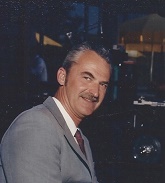
David B. Starkweather
Professor of Health Services Administration, Emeritus
David Starkweather, an expert in health services administration and hospital mergers at the UC Berkeley School of Public Health, and cofounder of Berkeley’s M.P.H./M.B.A. program, died unexpectedly in his sleep at home in Park Ridge, Illinois, on March 11, 2021.
Dave was born on April 25, 1933 in Newton, Massachusetts. He received his B.A. in sociology from Bowdoin College, and his M.S. in hospital administration from Columbia University. During the 1950s and 1960s he pursued a career in hospital administration, eventually working for Stanford University Hospital. Among many other accomplishments, Dave provided administrative support for the move of the Stanford Medical School and, later, the Stanford University Hospital from San Francisco to Palo Alto. In the 1960s, He was appointed to the position of administrative director of Stanford Hospital – the youngest administrative director to lead that hospital.
While at Stanford Hospital, Dave realized he was drawn to academic life: teaching, research, and mentoring students. He decided to pursue a doctoral degree and seek a faculty position at a university with an academic program in health services administration. He was admitted to the Ph.D. program in medical care and hospital organization at the University of California, Los Angeles, and studied under Dr. Milton Roemer, one of the nation’s leading health system analysts and an advocate for public health care systems. After completing his doctoral degree in 1967, Dave joined the UC Berkeley Public Health Faculty as an assistant professor of hospital administration.
Dave’s early career as a hospital administrator gave him professional experiences and perspectives that influenced his research and teaching. He chose research topics that were of great interest to practitioners as well as to scholars. His earliest work focused on the implications of the increasing growth in the size and complexity of hospitals during the 1960s, when hospitals in the U.S. were rapidly expanding and adding new technical capabilities and specialty services. Dave contributed greatly to our understanding of what we now know to be the most complex organizations ever created. His research identified the importance of many coordination mechanisms, such as vertical and horizontal communication, boundary spanners, empowerment of front-line workers, and cross-disciplinary training. His goal was to minimize errors and improve patient and staff safety.
Later in his career, Dave studied hospital mergers, a major trend in the hospital industry over the past forty years. Dave became one of the nation’s experts on such mergers. His major contribution to this field of study was his 1981 book, Hospital Mergers in the Making. Dave identified the motivations, facilitators, constraints, and barriers for hospital mergers and assessed the effects such mergers had on hospital physicians, nurses, managers, and other personnel, as well as on the communities they served.
In the late 1990’s Dave joined forces with UC Berkeley colleague Thomas Rundall and doctoral student Barbara Norrish to study nine hospitals that were funded by the Robert Wood Johnson Foundation and the Pew Charitable Trusts to improve patient care through organizational innovation and transformation. The study, funded by the same sources, was one of the first to identify the use of employee empowerment strategies as means of achieving organizational change. The findings were published in After Restructuring: Empowerment Strategies at Work in America’s Hospitals (1989).
Dave was a dedicated and inspirational teacher, gifted with the ability to integrate concepts from organizational and behavioral theories with practical knowledge of management techniques used in complex, high-reliability organizations. He cofounded UC Berkeley’s M.B.A./M.P.H. program with James Carman, a professor at the School of Business, in 1984 and served as its director from 1989 until 1994, when he retired. During his tenure as director, Dave became known nationally for developing a computer-based hospital financial management simulation game to teach students how financial decisions affect hospital performance. This simulation game was used for many years at UC Berkeley and other schools around the country.
Upon his retirement in 1994, Dave was awarded the Berkeley Citation, which recognizes distinguished achievement and notable service to the campus. The excellence that Dave brought to his teaching, research, and organizational leadership at UC Berkeley made him a worthy recipient of this honor.
After retirement, Dave remained in his long-time home in the East Bay city of Orinda for over ten years. He was an active member of the Orinda Community Church, a passionate home wine maker, an avid scuba diver and backpacker, and an active member of the Boy Scouts of America. In 2013, Dave and his wife, Faye, left Orinda to be closer to their son Brad and his family, first moving to Colorado and then to the Chicago area.
Dave is survived by Faye, Brad, daughter-in-law Barbara Marra, and grandchildren Anna, Siena, and Jack, all of Dana Point, California.
Thomas G. Rundall
2021
